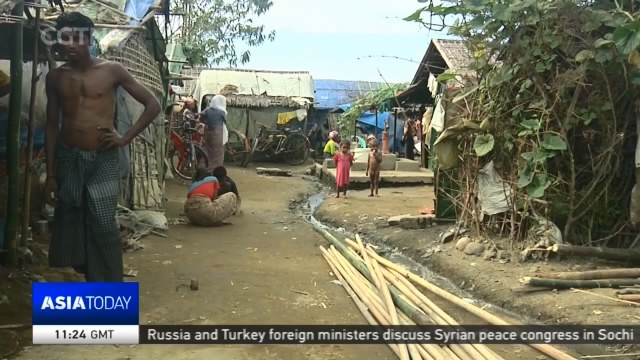
19:44, 28-Jan-2018
Myanmar Rohingya Crisis: Plan to repatriate Rohingya refugees delayed

Almost 700-thousand Rohingya refugees have fled from Myanmar to Bangladesh since late-August because of a counter-insurgency campaign in Rakhine State in the west of Myanmar. UN officials accuse Myanmar's army of ethnic cleansing, accusations the military denies. Recent plans to begin repatriating Rohingya refugees to Myanmar have been delayed. Now, there's on-going debate about whether or not repatriation should start anytime soon. Dave Grunebaum has the story.
These are camps being built for Rohingya refugees returning to Myanmar. They're located near the border with Bangladesh. But is it enough to convince them to come back? Myanmar says it's ready to start the process of repatriation and it has the support of an advisory board.
ROELOF PETRUS MEYER ADVISORY BOARD ON RAKHINE "The facilities are there and we believe it's important to encourage people to come back. (Do you believe they'd be safe to come back, the Rohingya refugees? ) Well that is difficult for us to say because we are not on a permanent basis on the ground. But from what we have in general observed that it's possible, in other words, that security will be provided."
The advisory board suffered a blow recently when former U.S. Ambassador to the UN Bill Richardson left. He says the board will likely become a cheerleading squad for government policy rather than proposing needed policy changes.
ROELOF PETRUS MEYER ADVISORY BOARD ON RAKHINE "Bill Richardson was making his comments too early and it's very unfortunate from that angle. There's no legitimacy in what he said."
DAVE GRUNEBAUM YANGON "For months the Myanmar government has closed off northern Rakhine to the United Nations and most humanitarian aid groups. The advisory board is recommending that these organizations be granted access. Until that happens, it seems unlikely that significant numbers of Rohingya refugees will repatriate."
PHIL ROBERTSON HUMAN RIGHTS WATCH "What Rohingya is going to take that kind of offer up without some serious international protection guarantees and there are none on the table."
ALISTAIR BOULTON UNITED NATIONS REFUGEE AGENCY "We need access so that we can accompany returns so that we can monitor returns and make sure that the conditions of safety and dignity are in place."
One major concern is that returning refugees could end up in a similar situation to Rohingyas in central Rakhine State. More than 100-thousand of them lost their homes in riots. Over five years later they're still living in camps waiting for their homes to be rebuilt.
ALISTAIR BOULTON UNITED NATIONS REFUGEE AGENCY "We would not wish to become involved or support the return to a situation of protracted further displacement or dislocation as we have currently in central Rakhine that is not an acceptable solution."
So now people wait to see the Myanmar government's next move and whether or not it will be enough to convince Rohingya refugees to return. Dave Grunebaum, CGTN, Yangon, Myanmar.

SITEMAP
Copyright © 2018 CGTN. Beijing ICP prepared NO.16065310-3
Copyright © 2018 CGTN. Beijing ICP prepared NO.16065310-3